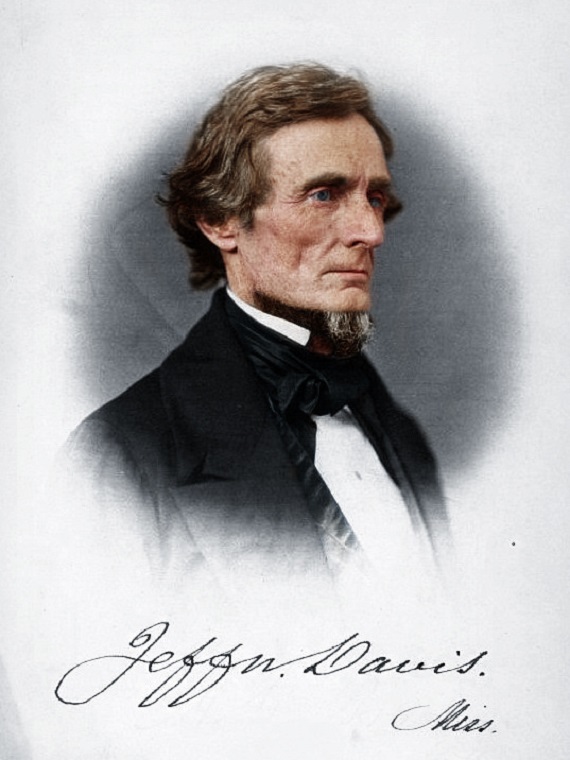Did Jefferson Davis reply to the Emancipation Proclamation with a threat to enslave all blacks in America?
That is what some historically challenged people on social media think.
Their evidence is a broadside reportedly published in January 1863 by the Richmond Enquirer as “An Address to the People of the Free States by the President of the Southern Confederacy.”
In other words, Jefferson Davis went to a local paper, published a policy statement, and never mentioned it again. Ever.
This document screams “fake news.” It should. Even the Library of Congress calls it a fake.
But let’s examine the document with a critical eye.
First, Davis never used the term “President of the Southern Confederacy” in any public documents during the War. He was always referenced as President of the Confederate States of America, even when signing public papers.
Second, Davis never referred to Abraham Lincoln as the “President of the Non-Slaveholding States.” He always called Lincoln “President of the United States” so as to differentiate the Confederacy with the foreign government to the North. Like all Southerners, Davis never believed the United States ceased to exist once the South left the Union, regardless of what some modern academics claim. It was now a foreign country, just as the Confederate States represented a sovereign federal republic.
Third, Davis did respond to the Emancipation Proclamation in his annual address to the Confederate Congress. You know what is missing? All of the details from the supposed “Address to the People of the Free States,” like that proposal to enslave all free blacks in every State of the Confederacy and every State occupied by the Confederate army. Such a position would have required the consent of Congress. Funny Davis left that out. If he was so determined to pursue this course, he would have mentioned it, many times. He never did.
Fourth, Davis supposedly concluded the piece by arguing that the “Old Union” would so be put back together and that slavery would soon be nationalized, meaning every State would be a slave state and that all blacks would be enslaved or reduced to “helot” status. Davis never used this type of language in any public or private document.
Fifth, a review of the Richmond Enquirer yields no reference to this address on the date it was reported to be published. The Enquirer had a daily and weekly paper. Neither contains the “Address.” Nor does any other Virginia paper from the period. The only newspaper that mentions the document was a Pennsylvania paper in November 1863, and then as a document in the possession of a Northerner. Again, no paper mentioned the “Address,” either in the North or the South, in January 1863. Such a public statement would have been major news if Davis actually wrote it.
Sixth, Rice University, the home of The Papers of Jefferson Davis, has rejected it’s authenticity, as did one of the most important Jefferson Davis scholars of the early twentieth century. No manuscript exists, and if this document was truly from Davis’s pen, you can bet every “Righteous Cause” mythologist would be talking about it.
The “Address” exemplifies the problem of “Twitter” history. Those who advance a clear political agenda really want something like the “Address” to be real, so much so that they have a hard time believing any evidence to the contrary.
History has become activism that lacks understanding, and establishment historians are often no better than those peddling “fake news” like the “Address.”







Good job, Professor McClanahan! I enjoy your work very much.
DITTO. He is an invaluable resource. I wish more people viewed his videos on YT. Perhaps more are watching at some other outlet.
My sincere thanks to Brion McClanahan for his fine article on President Davis’ so-called proclamation, as it corrects some lines in the film “Glory” that have long irritated me. In the movie, just after the black 54th Massachusetts Regiment was recruited following the Battle of Sharpsburg in September of 1862, Colonel Robert Shaw read to the troops what he said was part of an ordinance just passed by the Confederate Congress stating that any blacks captured in uniform were to be sent back to their home states and re-enslaved, as well as the mandatory execution of white officers commanding such units.
This was obviously some wording taken completely out of context from Confederate General Order No. 111 of December 24, 1862. That Order was based on a proclamation by President Davis which only referred to the reprehensible actions of General Benjamin Butler in New Orleans, including his still unauthorized recruitment of black troops. The Order also said that Butler was to be treated as a “felon” and “outlaw” and hanged if captured.
As far as I know, there was never any Executive proclamation issued or Congressional action taken by the Confederacy concerning the legal use of black troops by the Union after Lincoln’s Emancipation Proclamation took effect in January of 1863.
.
Dear Prof McClanahan,
Bravo for your excellent scholarship exposing the Fake News in times past. Apparently fake news is not new to our present time.
Tom Schaaf
Great Falls, Virginia
I’ve never heard of this before (thank God). Never trust the internet, since I recently found a blog devoted to the idea that Robert E. Lee was a pedophile.